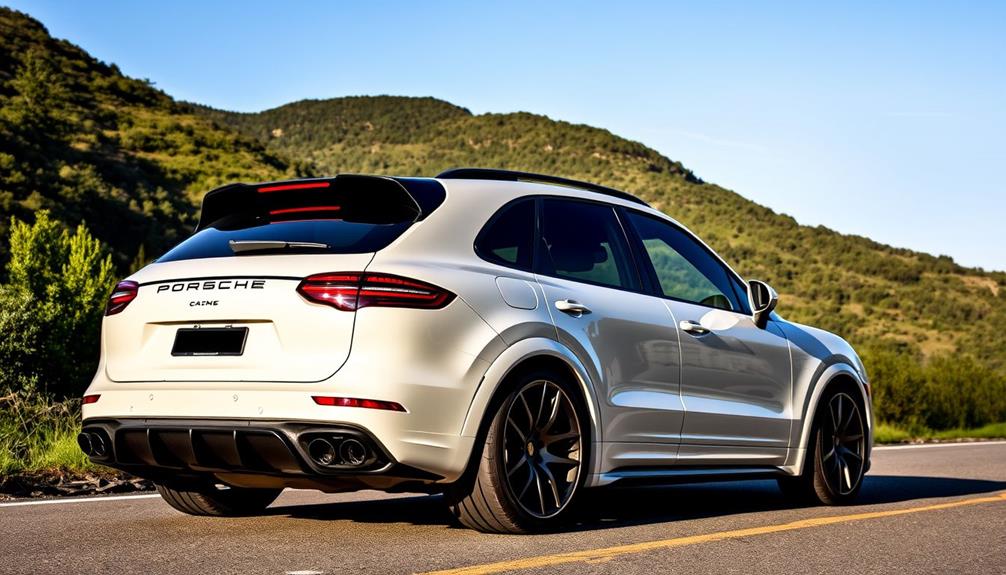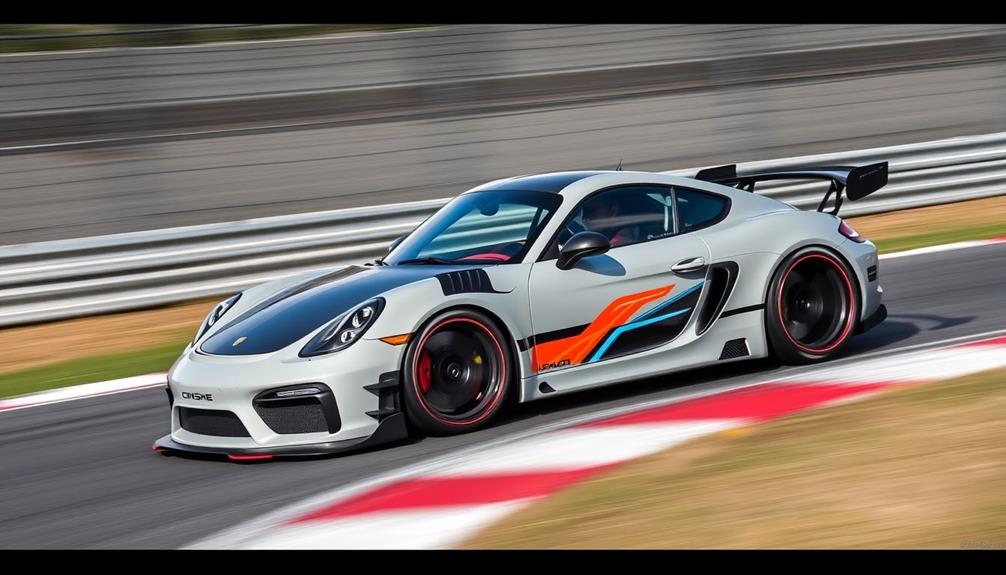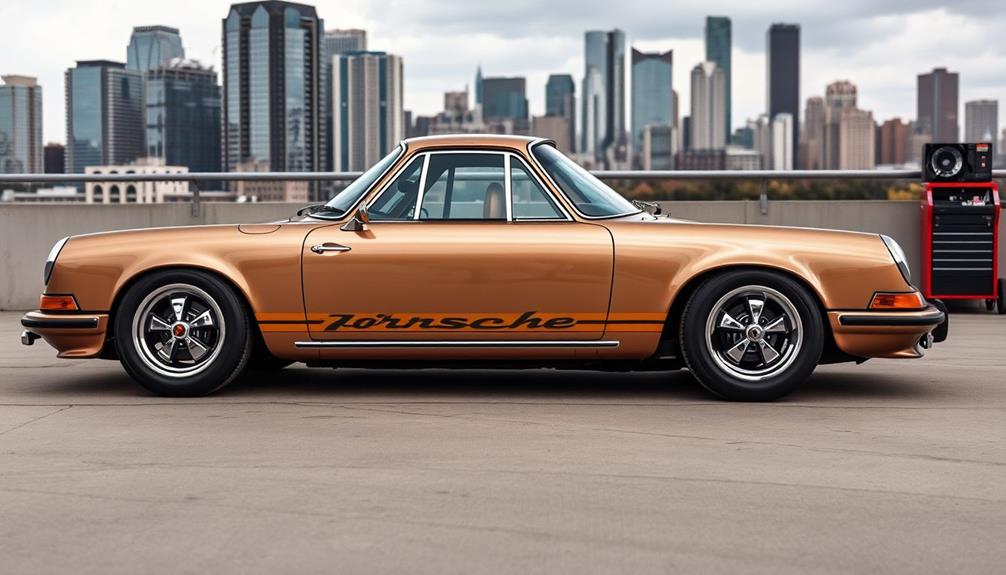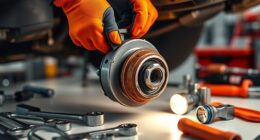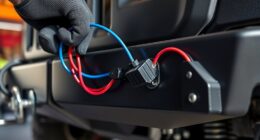Tuning your Porsche 911 Carrera releases its full potential, turning it into an exhilarating machine that enhances power, handling, and overall driving experience. You can boost horsepower and torque with engine tuning and ECU modifications. Upgrading your suspension improves agility and cornering, while lightweight components enhance responsiveness. You'll also benefit from better aerodynamics for increased stability. Performance testing helps guarantee your modifications are on point and maintain vehicle integrity. With these upgrades, you'll transform your iconic sports car into a true masterpiece. There's much more to explore in tuning that could elevate your driving pleasure even further.
Key Takeaways
- Tuning enhances the Porsche 911 Carrera's power and handling through ECU modifications, suspension upgrades, and lightweight components.
- Engine management upgrades can yield significant horsepower gains, optimizing fuel delivery and ignition timing for improved performance.
- Suspension enhancements, such as stiffer springs and adjustable dampers, improve cornering and driving dynamics for a more responsive ride.
- Aerodynamic improvements reduce drag and increase downforce, contributing to better stability and overall performance at high speeds.
- Regular performance testing ensures modifications enhance capabilities without compromising vehicle reliability, maintaining the integrity of the Porsche 911 Carrera.
Understanding Porsche Performance Tuning
When it comes to enhancing your Porsche's performance, tuning is essential. Porsche tuning focuses on optimizing power, handling, and overall driving dynamics, guaranteeing you get the most out of your 911 Carrera. Through strategic modifications, you can markedly boost your car's capabilities, enhancing your driving experience.
Performance tuning involves several important aspects, including engine tuning, suspension optimization, and aerodynamics. Advanced technologies play an important role here, fine-tuning fuel delivery, ignition timing, and turbo boost to maximize engine output.
Weight reduction is another significant factor; by shedding unnecessary pounds, you improve agility, responsiveness, and braking performance, leading to a more dynamic driving experience.
Comprehensive tuning requires upgrading multiple components, such as performance air intakes, exhaust systems, and high-performance braking systems. It's essential to consult with professionals to guarantee these modifications are executed correctly.
After tuning, regular performance testing and evaluation are necessary to assess improvements in speed, handling, and driving dynamics. This ongoing process helps you fine-tune your Porsche's performance further, allowing you to truly access the full potential of your iconic sports car.
The Basics of Performance Tuning

Performance tuning for your Porsche 911 Carrera is all about releasing the true potential of your vehicle. At its core, this process involves modifying the engine management system (ECU) to optimize key factors like fuel delivery, ignition timing, and air/fuel ratios. This optimization not only enhances performance but also guarantees your car responds dynamically to your driving input.
Porsche owners can also focus on upgrading essential components such as suspension, exhaust systems, and even reducing weight to improve handling and responsiveness.
Advanced technologies, including turbo boost adjustments and aerodynamic enhancements, play a critical role in reducing drag and increasing downforce, providing better stability at high speeds.
It's important to remember that regular performance tests post-tuning are significant. These tests help assess the effectiveness of your modifications, assuring a balanced increase in horsepower and torque across the rev range.
For those considering Stage 1 tuning for the 911 Carrera, you'll find it maximizes performance without extensive hardware changes, potentially leading to impressive gains of up to 700bhp with further modifications.
Embrace the journey of tuning to release the full prowess of your iconic sports car.
The Science Behind Tuning
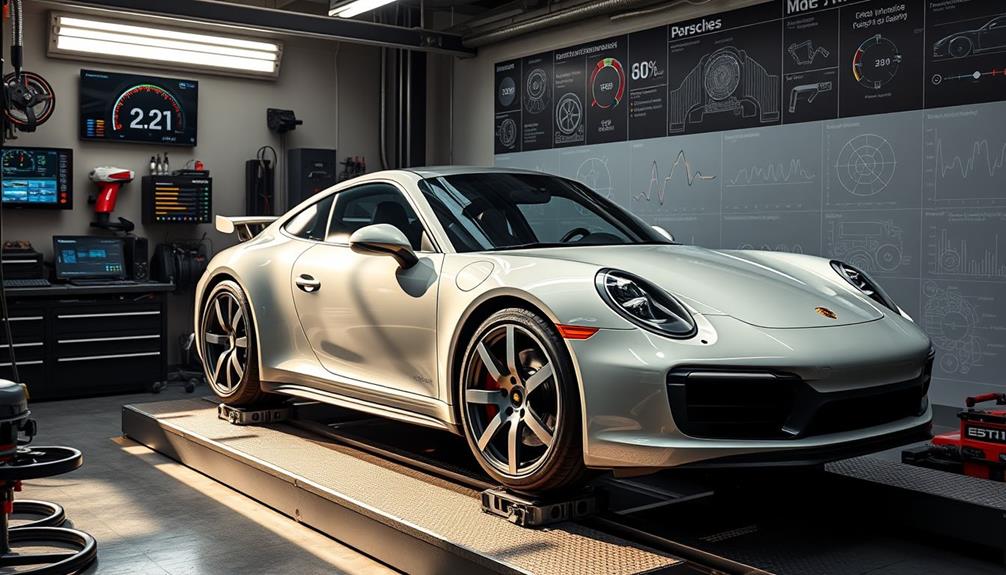
Understanding the science behind tuning reveals how precise modifications can release the full potential of your Porsche 911 Carrera. Performance tuning involves meticulously adjusting the engine management system (ECU) to enhance parameters like fuel delivery, ignition timing, and air/fuel ratios. These adjustments improve your vehicle's performance and responsiveness.
Advanced tuning techniques, such as increasing boost pressure beyond 1.6 bar, can lead to significant torque gains. However, these modifications require a careful balance to maintain consistency and reliability. By testing your changes on a Dynapack hub dyno, you can accurately measure performance improvements, achieving outputs like 436 whp and 420 lb-ft of torque across the rev range.
Tuning also enhances throttle response, which improves acceleration and cornering control. Features like launch control and switchable driving modes can be introduced, elevating your driving experience.
To guarantee these enhancements function effectively, regular performance evaluations post-tuning are essential. This way, you can confirm that your Porsche not only performs better but does so without compromising its integrity.
Embracing the science of tuning can transform your driving experience into something truly exhilarating.
Essential Components for Tuning
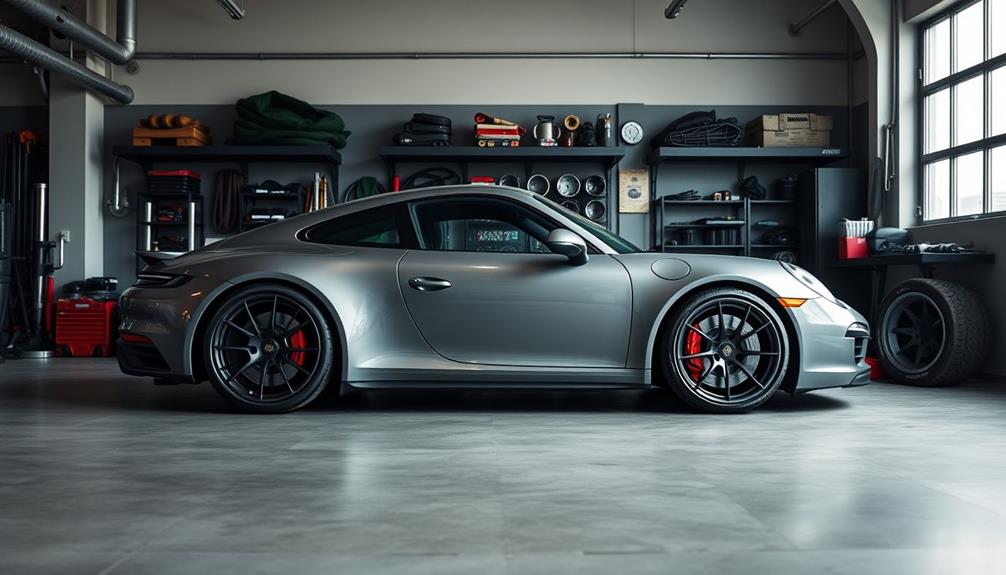
When tuning your Porsche 911 Carrera, upgrading the engine management system is a game-changer, optimizing fuel delivery and ignition timing for peak performance.
Suspension upgrades, like stiffer springs and adjustable dampers, can dramatically enhance handling and cornering stability.
Together, these essential components transform your driving experience.
Engine Management System
Tuning the engine management system (EMS) in your Porsche 911 Carrera can release a new level of driving excitement. The EMS plays a critical role in optimizing your car's performance by precisely controlling fuel delivery, ignition timing, and air-fuel ratios.
When you reprogram the ECU, you replace conservative factory settings with aggressive performance calibrations that boost horsepower and torque. Advanced tuning can even enhance boost pressure beyond factory limits, offering significant gains in engine output.
However, it's important to manage these adjustments carefully to maintain reliability. Effective data logging capabilities in modern EMS allow you to monitor real-time engine performance metrics, making it easier to fine-tune settings based on driving conditions.
You'll notice substantial improvements in throttle response and overall driving dynamics after a successful EMS tune. This means your Porsche 911 Carrera won't only perform better but also provide a more exhilarating driving experience.
Suspension Upgrades and Enhancements
Upgrading the suspension on your Porsche 911 Carrera can dramatically transform your driving experience, enhancing both handling and cornering stability.
With the right performance parts, you can unleash the full potential of your iconic sports car. One effective method is to lower the body height by approximately 10 mm using the PASM Sport suspension, which lowers the center of gravity, improving agility during turns.
Consider the following key components for your suspension upgrades:
- Stiffer Springs: Enhance performance characteristics and reduce body roll during high-speed maneuvers.
- Adaptive Dampers: Integrate optional dampers to continuously adjust damping force for the best ride comfort and stability.
- Lightweight Components: Utilize aluminum control arms and performance bushings to reduce weight and increase road feedback.
- PASM System: Leverage Porsche's Active Suspension Management for real-time adjustments based on road conditions.
Tuning Different Porsche Models
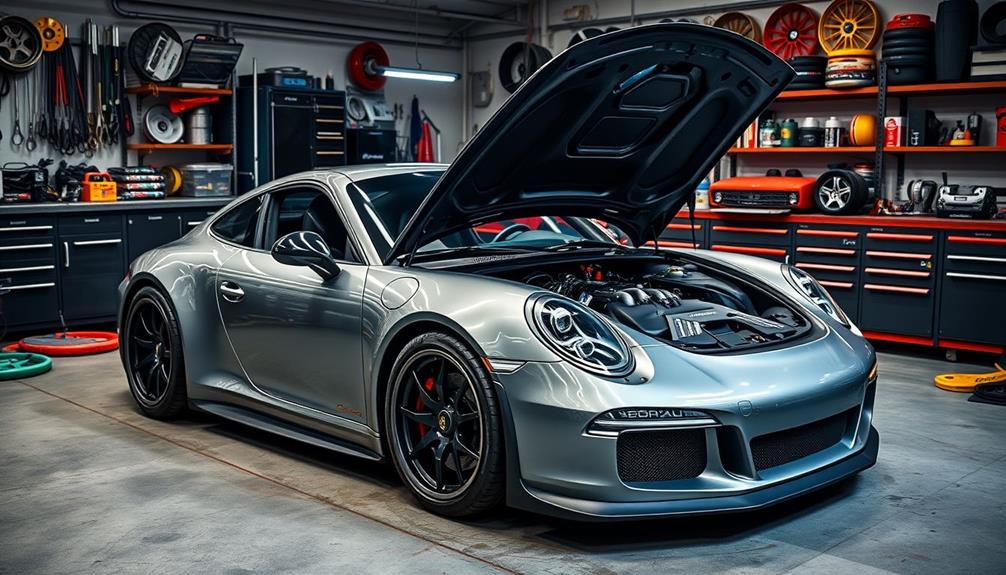
When tuning different Porsche models, you need to take into account each car's unique characteristics and performance goals.
For instance, the 911 Turbo may require aerodynamic upgrades, while the Cayman focuses on enhancing handling.
After making these modifications, you'll want to test and evaluate the improvements to guarantee you're getting the best performance out of your vehicle.
Model-Specific Tuning Techniques
For each variant of the Porsche 911, unique tuning techniques are vital to release their full potential.
Each model, whether it's the Carrera, Carrera S, or GTS, has specific requirements that cater to optimizing the Porsche engine's performance.
Here are some key tuning offers to take into account:
- ECU Remapping: Fine-tuning the engine management system enhances fuel delivery and ignition timing, leading to improved horsepower and torque.
- High-Flow Air Intakes: Upgrading to high-flow air intakes can greatly increase airflow, allowing your engine to breathe more freely and perform better.
- Suspension Adjustments: Tailoring your suspension, especially with systems like the PASM Sport suspension, enhances handling characteristics for both track and road.
- Performance Testing: Post-tuning, using dyno tests is essential to assess gains in horsepower and torque across various RPM ranges, ensuring your modifications are effective.
Performance Upgrades Overview
Performance upgrades can transform your driving experience, especially when tuning different Porsche models. For the Porsche 911 Carrera, you can start with ECU tuning, which optimizes fuel delivery and ignition timing, potentially achieving impressive outputs of 436whp and 420lb of torque. This upgrade greatly enhances performance and responsiveness.
Next, consider suspension enhancements like Active Suspension Management (PASM) and stiffer spring setups. These modifications improve handling and cornering, resulting in a more engaging driving experience.
Upgrading the exhaust system is another excellent option; it reduces backpressure, enhances the engine's sound, and contributes to performance improvements.
Lightweight wheels and optimized aerodynamics play an essential role as well. They enhance acceleration and top speed while reducing mass and drag, which positively affects overall vehicle dynamics.
If you're looking for extensive options, tuning packages like the GD600 can push performance to new heights, targeting up to 600bhp while ensuring compatibility with existing components to maintain reliability and safety.
Testing and Evaluation Methods
Evaluating the effects of tuning on different Porsche models, such as the 911 Carrera and Cayman, requires a systematic approach to testing.
It's essential to guarantee that your modifications genuinely enhance performance without compromising reliability. Here's a structured method to guide you through the evaluation process:
- Baseline Testing: Conduct initial performance tests to establish a benchmark, focusing on metrics like lap times and acceleration rates.
- Dyno Testing: Utilize Dynapack hub dynos for precise measurement of power and torque before and after modifications, guaranteeing consistent performance gains across the rev range.
- Data Collection: Compare pre- and post-tuning performance metrics, adjusting based on test results to optimize your tuning further.
- Continuous Evaluation: Regularly assess the car's performance post-modification to guarantee compliance with local regulations and maintain reliability.
The Tuning Process
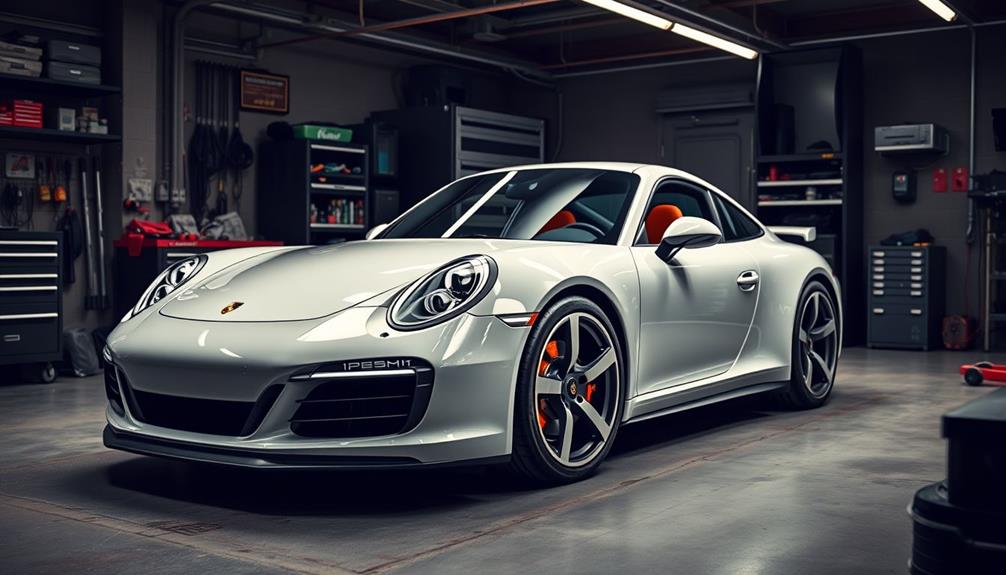
When tuning a Porsche 911 Carrera, the process kicks off with a thorough assessment of the car's current performance metrics, such as horsepower, torque, and handling. This initial evaluation helps you understand how tuning allows Porsche owners to tailor their vehicle's performance to fit their unique driving style.
Next, you'll focus on modifying the engine management system (ECU). Adjustments to fuel delivery, ignition timing, and boost pressure are vital to enhance performance while ensuring reliability. Performance tests using a Dynapack hub dyno confirm that your tuning adjustments yield consistent gains across the rev range, with potential increases up to 436 whp and 420 lb-ft of torque.
Don't overlook suspension upgrades, which play an important role in the tuning process. Implementing stiffer springs and adjustable dampers improves cornering capabilities and overall driving dynamics, making your Porsche feel even more responsive.
Benefits of Performance Tuning
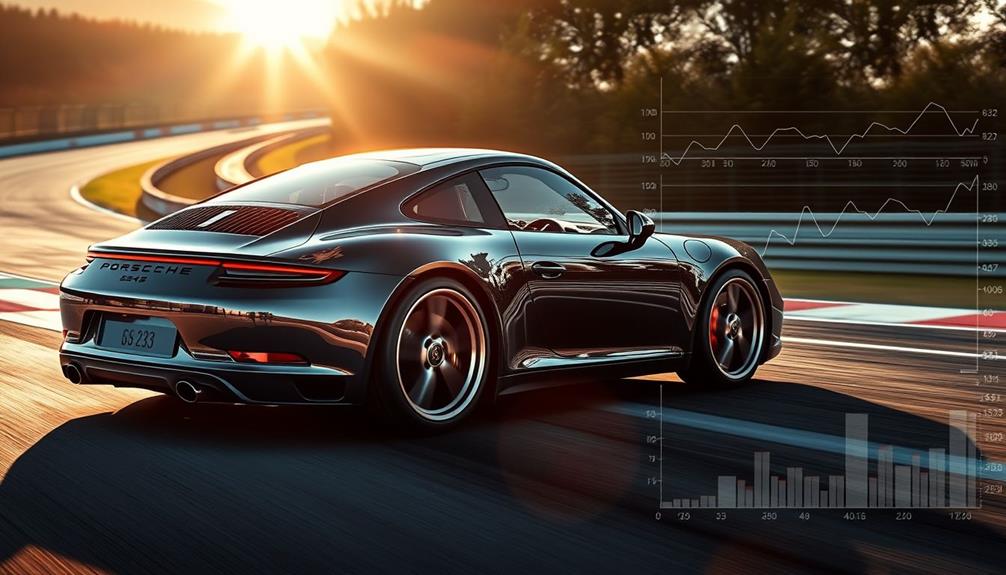
Tuning your Porsche 911 Carrera releases a host of benefits that elevate your driving experience. With performance tuning, you'll reveal enhanced performance that transforms how you interact with the road.
Here are some key advantages:
- Increased Power: Achieve up to 436whp with Stage 1 modifications, giving you a significant boost in horsepower and torque for exhilarating acceleration.
- Improved Throttle Response: Experience better cornering control, making your drives more dynamic and engaging, perfect for those twisty roads.
- Advanced Features: Enjoy options like launch control and switchable driving modes, allowing you to tailor your driving experience to different conditions, whether on the track or city streets.
- Optimized Fuel Economy: Maintain efficiency during respectful driving, ensuring enhanced performance doesn't come at the cost of fuel consumption.
For Porsche enthusiasts, these benefits not only enhance your vehicle's capabilities but also deepen your connection to this iconic sports car.
Embrace the thrill of driving a finely tuned machine, and discover the full potential of your Porsche 911 Carrera. Unleash the power of your Porsche 911 Carrera with cobb tuning porsche performance upgrades, designed to optimize the engine, suspension, and overall driving experience. From increased horsepower and torque to enhanced handling and responsiveness, these upgrades will take your driving experience to new heights. Experience the exhilaration of pushing your Porsche to its limits and feeling the raw power of precision engineering at your fingertips.
Maintenance for Tuned Porsches
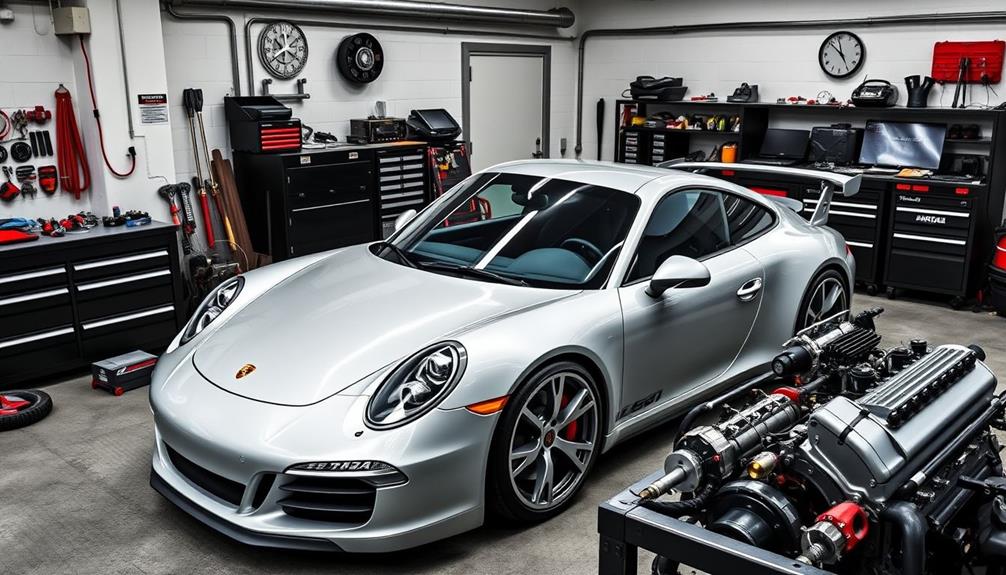
To keep your tuned Porsche 911 Carrera running at its best, regular maintenance checks are indispensable. After tuning, the performance demands on your vehicle increase considerably, making it essential to monitor the engine and other components closely.
You should schedule professional inspections to assess how modifications affect the engine, suspension, and braking systems, confirming they function effectively under heightened performance conditions.
Additionally, keep an eye on fuel efficiency post-tuning. Monitoring this can reveal how your modifications influence overall performance and help you make adjustments for better economy.
It's important to document all tuning modifications and performance enhancements; this history will be invaluable for future maintenance and resale value.
Staying engaged with the tuning community and manufacturers can also enhance your understanding of advancements in tuning technologies and components.
This knowledge not only helps in maintaining your vehicle but also guarantees you're making informed decisions about future upgrades.
Aftermarket Parts and Upgrades
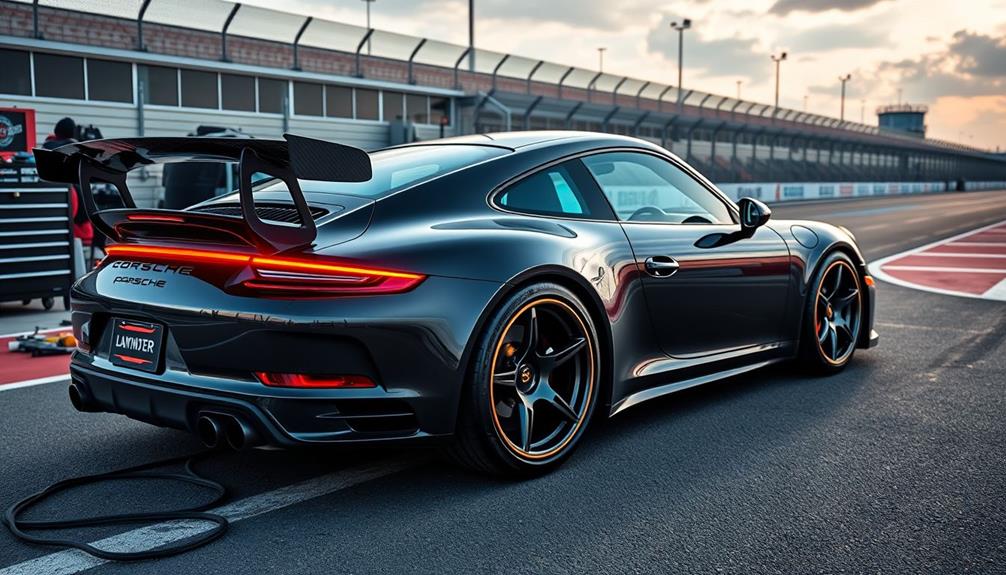
Enhancing your Porsche 911 Carrera with aftermarket parts and upgrades can transform your driving experience, pushing performance to new heights.
By incorporating well-chosen aftermarket performance parts, you can access the full potential of your iconic sports car. Here are some key upgrades to take into account:
- ECU Tuning: Utilizing solutions like COBB Tuning's Accessport V3 can optimize your engine's fuel delivery and ignition timing, greatly boosting horsepower and torque.
- High-Flow Air Intakes: These upgrades improve engine airflow, enhancing overall efficiency and responsiveness.
- Suspension Upgrades: Investing in coilover systems and adjustable sway bars enhances handling and cornering stability, giving you a more dynamic driving experience.
- Aftermarket Brake Systems: Upgrading to larger calipers and carbon-ceramic discs guarantees superior stopping power and heat dissipation, which is essential for aggressive driving.
Frequently Asked Questions
What Is the 0 to 60 Time of a Porsche 911 Carrera S?
The Porsche 911 Carrera S can accelerate from 0 to 60 mph in just 3.1 seconds. Its powerful engine, advanced transmission, and all-wheel-drive system work together to deliver this impressive performance you'll love experiencing.
What Are the Best Upgrades for Porsche?
When you're seeking the best upgrades for your Porsche, consider enhancing performance with exhaust systems, boosting airflow with performance intakes, tuning the ECU for precision, and upgrading suspension for improved handling and responsiveness.
Is the Porsche 911 Considered a Supercar?
Yes, the Porsche 911's exceptional performance, advanced technology, and iconic design classify it as a supercar. Its impressive horsepower and speed capabilities make it a standout choice for enthusiasts seeking thrilling driving experiences.
What Is the Most Fun Porsche to Drive?
Imagine cruising in a classic '60s sports car; you'll find the Porsche 911 Carrera is the most fun to drive today. Its responsive handling and thrilling acceleration make every journey an exhilarating experience you won't forget.
Conclusion
To sum up, tuning your Porsche 911 Carrera can release a staggering increase in horsepower, often boosting it by up to 20%. This means you could transform your already thrilling ride into a powerhouse that's even more exhilarating on the road. With the right upgrades and maintenance, you'll not only enhance performance but also elevate your driving experience to a whole new level. Embrace the journey of tuning and enjoy the true potential of your iconic sports car!

